
24,000 tourism jobs could be lost in 2023 by reintroducing the 13.5% VAT rate on 1 March 2023 – Jim Power
Economic report finds that the proposed 50% VAT rate increase in tourism sector would further undermine the competitiveness of a sector already under significant pressure
An economic report byEconomist Jim Power has found in the event of an increase in the VAT rate, a decline of 10% in employment is possible in the tourism sector in 2023, which would represent a loss of around 24,000 jobs. Commissioned by the Irish Tourism Industry Confederation (ITIC), the Economic Rational for Extending the 9% VAT rate beyond 28th February 2023 report states that the proposed VAT increase would further undermine the competitiveness of a sector that is currently under significant pressure and facing many challenges in 2023.
According to the report, competitiveness is of key significance for the tourism sector. The proposed increase in the VAT rate from 9% to 13.5% (increase of 50%) on 1st March 2023 would further undermine the competitiveness of the tourism sector. Given the margin pressures that hospitality and tourism-related businesses are currently enduring, it does not seem feasible that the incidence of the tax increase could be absorbed into margins, and it would be passed on to the end user or the consumer. If fully passed on to the consumer, it would increase the price of accommodation and food services by around 4.1%. Coming at a time when there is such upward pressure on prices, this would be negative and would undoubtedly dampen demand further in the tourism and hospitality sector.
Jim Power, economist and report author, states: “The bottom line is that the risk of a downturn in international travel caused by a marked deterioration in the global economy is very real and could have serious implications for Ireland’s tourism industry. It would threaten the viability of businesses still struggling to recover from the impact of Covid-19. Many more businesses could be forced to shut down and thousands of jobs could be lost. The real issue is that the global economic difficulties are coming on top of many business pressures emanating from dramatically higher input costs; cost of living pressures; labour shortages and rising interest rates. An increase in the VAT rate would exacerbate those pressures”.
Estimates from ITIC suggest that 5.8 million visitors arrived in Ireland in the first 8 months of 2022 and it is anticipating in the region of 7.5 million tourists (staying for 1 night) for the full year. This compares to 9.67 million tourists in 2019. The economic contribution of tourism is very significant at both a regional and national level. Fáilte Ireland estimates that every €1 million of tourist expenditure helps to support 27 tourism jobs; 1,000 additional overseas tourists support 20 jobs in the tourism industry; and for every euro spent on tourism, both domestic and overseas, 23 cent is generated in tax revenues. It is estimated that in 2022, approximately 243,900 people were employed in the tourism industry.
Jim Power concluded by saying: “The tourism industry is a very significant component of the Irish economy. It makes a significant contribution to service exports; it generates considerable Exchequer revenues; it supports a high level of employment; and is a vital component of economic and social vibrancy in rural Ireland. The Department of Tourism, Culture, Arts, Gaeltacht, Sport & Media has a number of objectives for the sector. The aim is to support a vibrant sector that contributes to employment across the country; that is economically, socially and environmentally sustainable; that helps promote a positive image of Ireland overseas; and is a sector in which people want to work. The plan to increase the VAT rate to 13.5% this March is not consistent with these objectives. Given the global and domestic challenges facing the sector, the timing of the proposed increase could not be more damaging”.












